Politics
/
October 28, 2024
Even some actual billionaires are happy to betray democracy for Trump’s favors—and fear and greed help keep the rest in line.
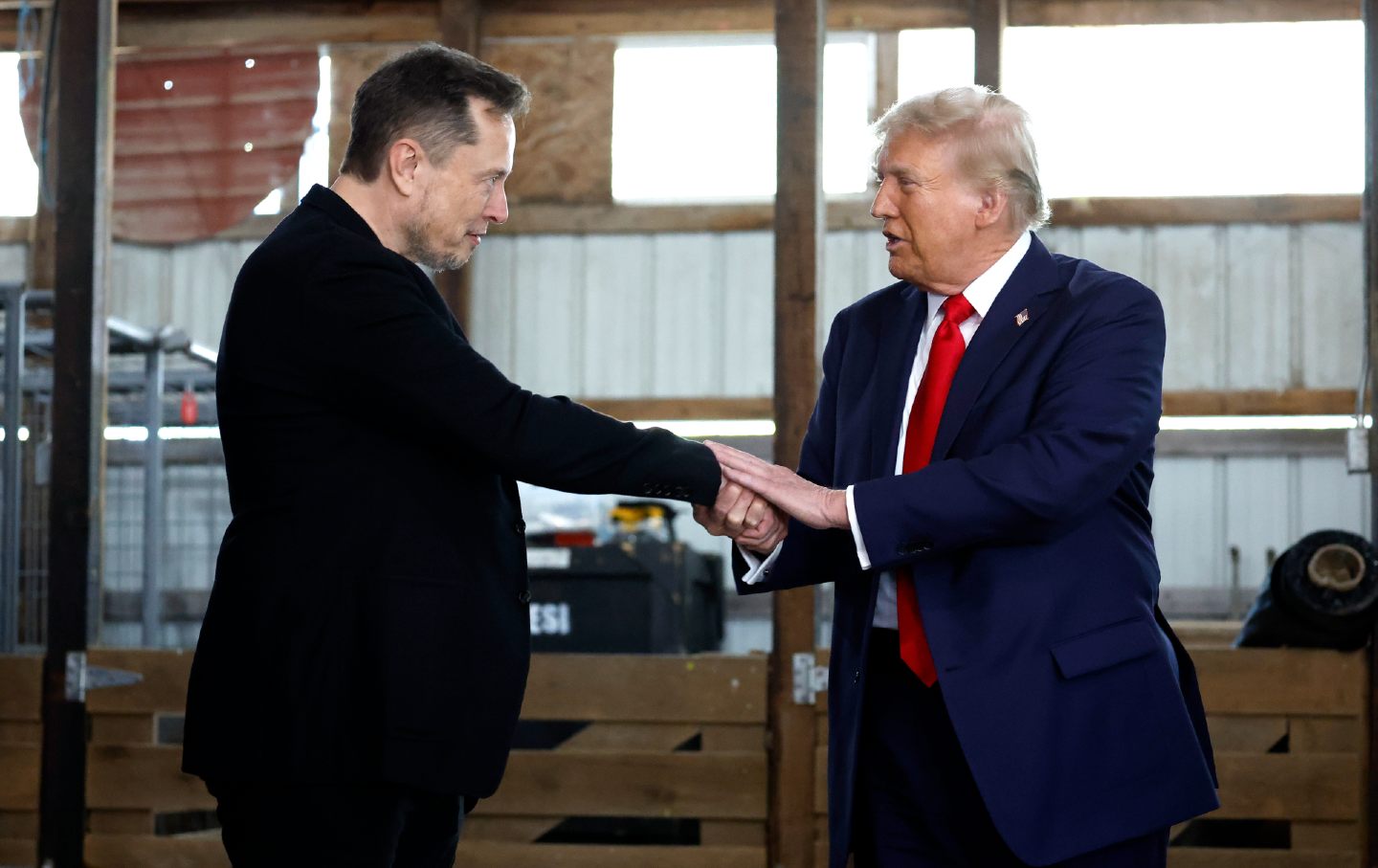
In an interview with Politico in June, Kathryn Wylde, president and CEO of the Partnership for New York City, offered one of the most illuminating comments on the 2024 election. Republicans, Wylde said, conveyed to her that “the threat to capitalism from the Democrats is more concerning than the threat to democracy from Trump.” Wylde was referring to a particular class of Republicans: very wealthy ones. Wylde’s organization is a lobby group for business leaders, so it is her job to have a finger on the pulse of the city’s tycoons.
Democrats have made two somewhat contradictory arguments in this election. One is the claim that Trump is an authoritarian threat, little less than an American Adolf Hitler. This analysis has the advantage of being supported by evidence from those who worked closely with Trump, including former chief of staff and retired general John Kelly and former adviser Steve Bannon (who marveled in admiration, “That’s Hitler!” when Trump announced his first presidential run in 2015). The second is that, because of Trump’s threat to democracy, conventional Republicans (including business leaders) should rally to the Democrats as part of a broad anti-Trump coalition. Billionaire Mark Cuban, a major surrogate for the Harris campaign, has been particularly vocal in making this argument. In an interview with MSNBC Cuban said, “There’s really no good reason to vote for Donald Trump as the business candidate. In doing business, whether you’re a small company or a very large company, you want stability…. You don’t want to be Carrier air and find out that he’s threatening you if you move employees.” Cuban added that business leaders feared Trump’s “retribution” and “vengeance.”
Cuban is clearly making a pitch to his fellow billionaires to join the Democratic Party. It’s an argument that has had some success: According to Forbes, 81 billionaires back Harris, as against just 52 supporting Trump. Prominent rich folks backing Harris include Sheryl Sandberg of Meta, media magnate (and former New York mayor) Michael Bloomberg, film director Steven Spielberg, and even the normally nonpartisan tech lord Bill Gates.
Yet the simple listing of names doesn’t convey an important qualitative difference: Trump’s ties to the 1 percent are much more intimate than that of any president in history. The drama of Trump’s life has been that, as the son of a striving real estate developer from Queens, he’s often felt that the holders of established wealth have looked down on him. By becoming president, Trump has finally made it into the club of the real billionaires, who are now his cronies at Mar-a-Lago.
Current Issue

The extent to which Trump is the candidate of the billionaire class becomes clear when we note that a much higher percentage of his donations come from the very richest Americans. As the Financial Times reports: “Trump is particularly dependent on US elites, with about a third of the money raised by the campaign and allied groups coming from billionaires, compared to about 6 per cent of the funds raised by Harris-aligned groups.” In other words, Harris could give up her billionaire funding and it would barely make a dent in her coffers, whereas billionaire money is essential for Trump.
The degree to which the Democratic Party is swayed by rich donors is regrettable. But Trump has taken the American political system’s habitual deference to money to a new level by pushing for a government where the rich exercise direct power—and also by making threats against anyone who publicly opposes him. The appeal of this type of plutocracy to the rich explains why a significant chunk of wealthy people are immune to Cuban’s pitch for Harris.
Trump likes to praise the America of William McKinley, when tariffs were high and regulations almost nonexistent. That is the vision he’s selling to the rich: a return to the unchecked powers of the Gilded Age.
The ultrarich have a great instinct for self-interest; indeed, we might call it one source of their wealth. As such, it is surely foolish to rely on them to be civic-minded in an emergency.
In truth, most of the richest Americans have rallied to Trump or made a separate peace with him. Far more numerous than the rich who have endorsed either Trump or Harris are those who have decided to keep a low profile and not take sides. Here, the motivation is surely a mixture of greed and cowardice.
Wylde has a more accurate sense of where the business elite is than Cuban does. Tellingly, the wealthy supporters of Trump aren’t at all blind to his threat to democracy. Many of them condemned his incitement of the January 6 attack on the Capitol. But at the end of the day, Trump’s being an autocrat is less important than the fact that it is in their self-interest to support him—for reasons both of greed (Trump will renew the tax cuts of 2017, which will mean trillions more in the coffers of the wealthiest Americans) and fear (Trump will use the power of the presidency to exact vengeance on his enemies). The greed motive is furthered by the fact that, even if Joe Biden and Kamala Harris are far short of being socialists, they have supported more government activism than the United States has seen in a generation.
In other words, if the choice is between democracy or self-interest, the rich will choose self-interest. In June, Politico reported:
Republican business titans from hedge fund executive Nelson Peltz to hotel mogul Robert Bigelow have come out in favor of the presumptive GOP nominee. Even those who loudly denounced Trump’s efforts to overturn the results of the 2020 election are backing his bid to return to the White House.
Blackstone Group CEO Stephen Schwarzman—who once labeled the U.S. Capitol insurrection that followed a Trump speech on Jan. 6, 2021, “an affront to the democratic values” of the country—is once again one of the former president’s most important allies on Wall Street. Top financiers like hedge fund billionaire Bill Ackman, who called on the then-president to resign over the riot, and Citadel’s Ken Griffin, who dubbed Trump a “three-time loser” in elections, are considering offering their support.
Since that report, Ackman has come out as a major Trump supporter; Griffin continues to keep his distance from the former president while financing downballot conservative candidates. But even Griffin is hardly a member of the anti-Trump coalition.
In addition to the traditional Republican rich, even more-moderate magnates are making peace with a possible Trump restoration. It’s notable that in the last week two billionaires who own major newspapers —Jeff Bezos (The Washington Post) and Patrick Soon-Shiong (the Los Angeles Times)—both reportedly overrode the decision of editorial boards and quashed endorsements of Harris. Bezos’s reported role in the decision has been disputed by publisher William Lewis, who claims it was his own decision. Patrick’s daughter, Nika Soon-Shiong, claimed that the family rejected the endorsement because of the Biden-Harris government’s support of Israel’s war in Gaza—a contention later disputed by her father in an interview with his newspaper.
Surely, the most plausible explanation is that Bezos and Soon-Shiong are acting out of naked self-interest. There is, after all, scant reason to trust Lewis—a man known for his journalistic dirty tricks and servility toward his employers. Besides, Trump has repeatedly promised to use the state to punish his political enemies; Harris has made no such threats. Given a tight election, simple prudence would dictate that it’s better not to anger Trump—even if that means annoying Harris.
Popular
“swipe left below to view more authors”Swipe →
Trump is a genuine believer in plutocracy: He thinks the best society is one where the rich are in charge. In his term as president, the upper echelon of government resembled Mar-a-Lago: government of the country club set, by the country club set, for the country club set. As Politico reported in 2017, “Trump has amassed a Cabinet of unheard-of wealth, filled with business executives and CEOs. But he has also quietly appointed a number of his richest friends and allies to unpaid jobs of importance, where their responsibilities are blurry but their power could prove immense.” Trump cronies in power included Rudy Giuliani, Carl Icahn, Richard LeFrak, and Steven Roth.
Susan B. Glaser, in an extensive report in The New Yorker on Trump’s alliance with billionaires, documents that figures like Elon Musk, who has emerged as a top Trump surrogate, expect similar arrangements during a second term, when the government will become their playground. To a degree that is unusual even in the United States—which has long had a political system where corporations hold considerable sway over government—Trump has openly tailored his platform to suit the policy preferences of his donors on issues ranging from TikTok and cryptocurrency to fossil fuels and foreign policy. Trump’s true motto is not Make America Great Again but Quid Pro Quo.
Unfortunately, the Democrats, while not quite so openly for sale, are also reliant on rich donors, which makes it hard for them to make an issue of Trump’s brazen corruption.
Glaser lays out the contradictions of the Democratic Party’s position:
Trump’s courting of billionaires has been an explicit part of the Democrats’ campaign against him. At the Democratic National Convention, in August, Harris said that the ex-President’s populist rhetoric did not match the reality of a man who “fights for himself and his billionaire friends.” But the talking points miss an uncomfortable fact for both parties: during the Trump era, it’s the Democrats who have enjoyed a clear advantage with the nation’s wealthiest political donors. According to OpenSecrets, big donors—those who gave $100,000 or more to just one party—contributed $5.2 billion to Democratic causes and candidates in the last election cycle, and $3.3 billion to Republican ones. Despite Trump’s cultivation of the crypto bros and Wall Street money, his online chats with Musk and his Mar-a-Lago fund-raisers with Big Oil executives, that trend is on track to continue this year. A recent Bloomberg survey of billionaires showed Harris receiving support from twenty-one of the country’s richest people, compared with fourteen who were backing Trump. The difference, though, is that Trump had taken in millions more from these supporters. His campaign is far more dependent on its shrinking segment of the ultra-rich.
Yet, despite the exposed position of the Democrats, they could still make an issue of the fact that Trump has taken traditional graft to a new and dangerous level. This is especially pertinent because the actual agenda of the rich to dismantle the regulatory state—as outlined in Project 2025—is hugely unpopular. In a recent town hall, Musk said that Trump’s policies would result in “temporary hardship.” This is surely a fact worth advertising.
In a rally in Madison, Wisconsin, last Wednesday, the Democratic Party’s vice presidential nominee, Tim Walz, said:
They’re saying the quiet parts out loud now, because Donald Trump has already promised that he would put Elon in charge of government regulations that oversee the businesses that Elon runs. In other words, Donald Trump, in front of the eyes of the American public, is promising corruption. That’s what he’s promising you.
Unfortunately, Walz’s populism is only a minor key in the Democratic Party’s campaign, easily missed amid the elevation of figures like Mark Cuban and Liz Cheney. In this final week of the campaign, Democrats would do well to repeat Walz’s critique as loudly as possible.
More from The Nation
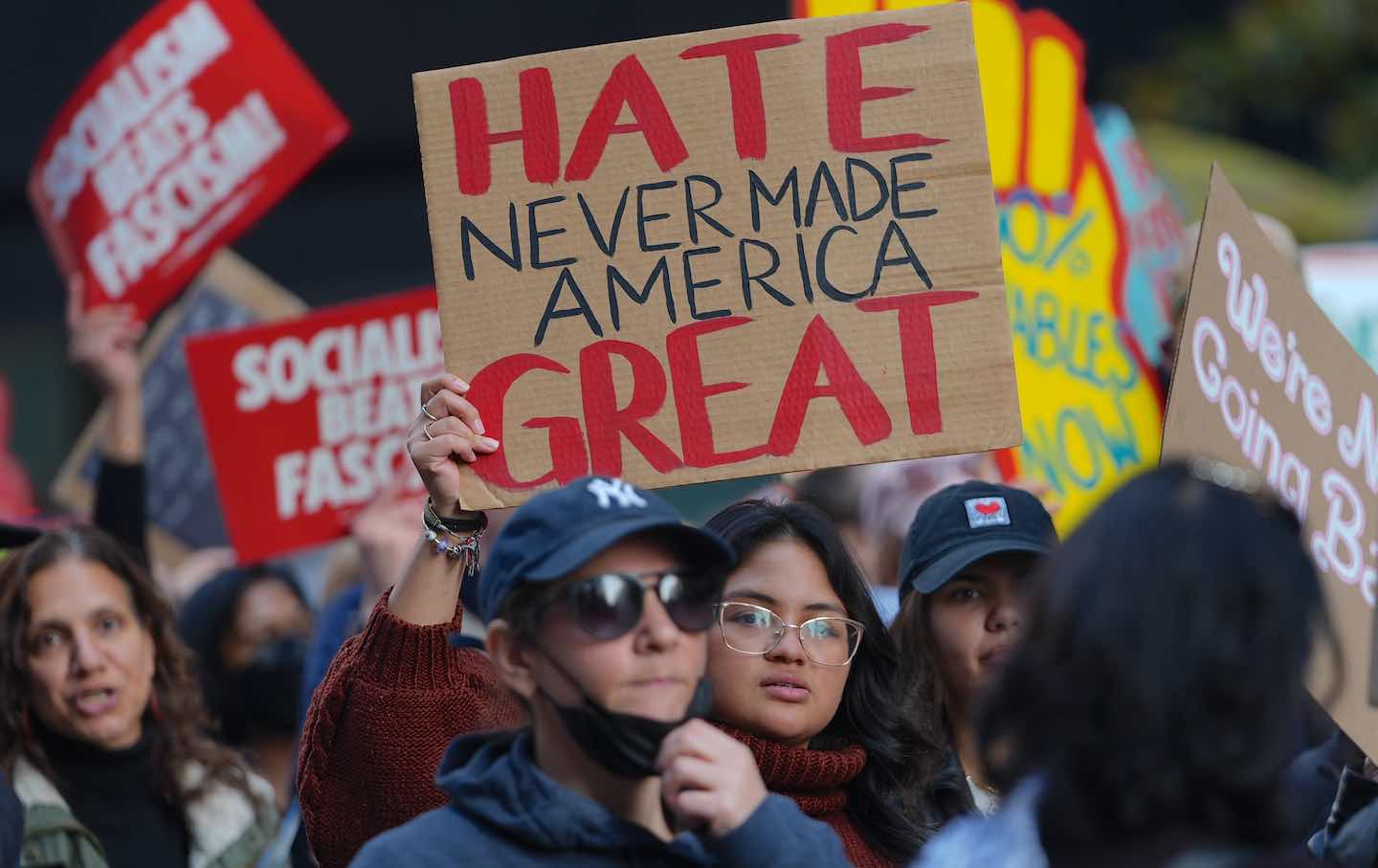
The late President Jimmy Carter warned repeatedly that oligarchy was threatening democracy in the United States. He was right.
John Nichols
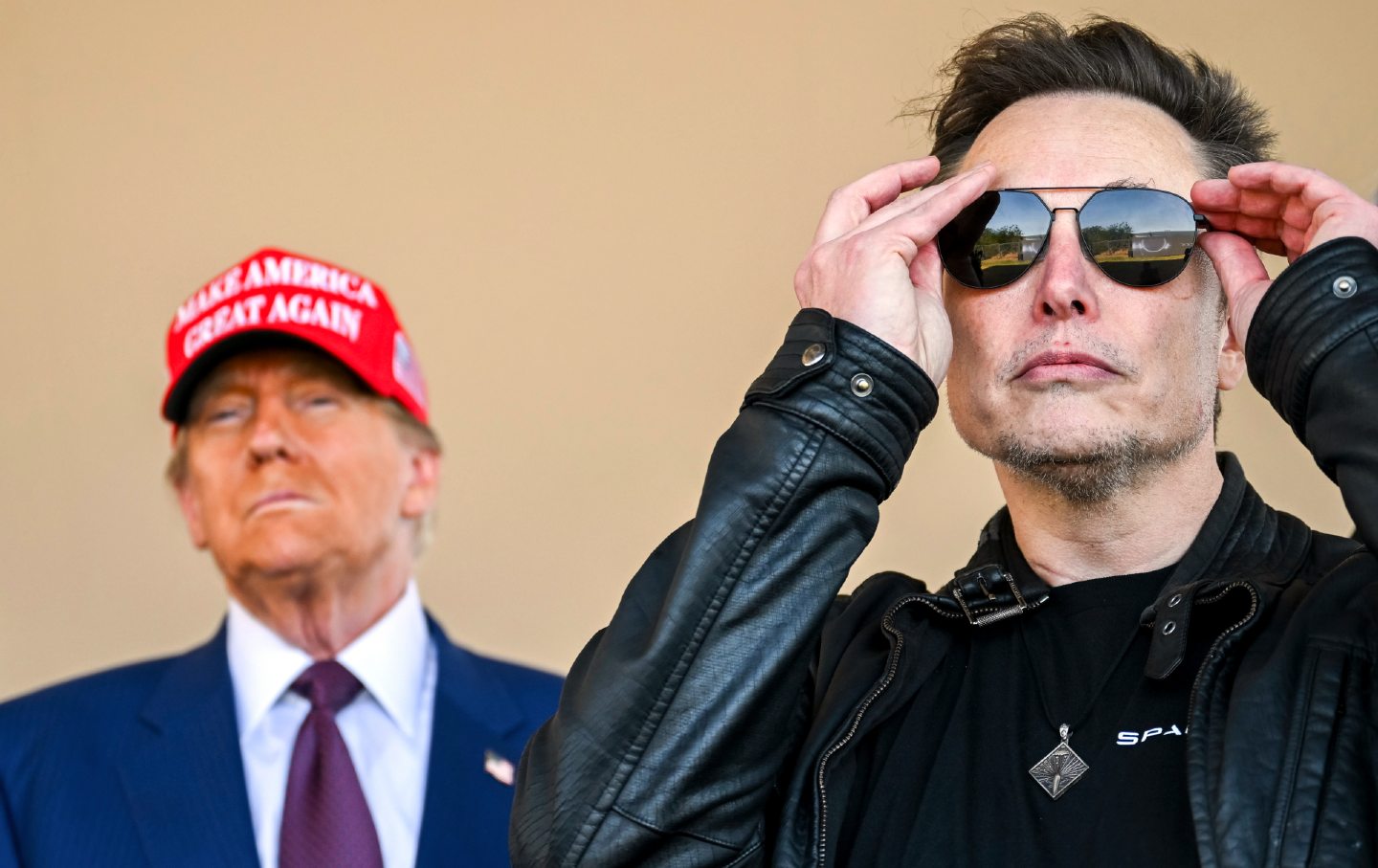
Elon Musk and Vivek Ramaswamy champion the educated immigrants who fuel tech-sector growth. Trump just decided he does, too. We’ll see if that lasts.
Joan Walsh
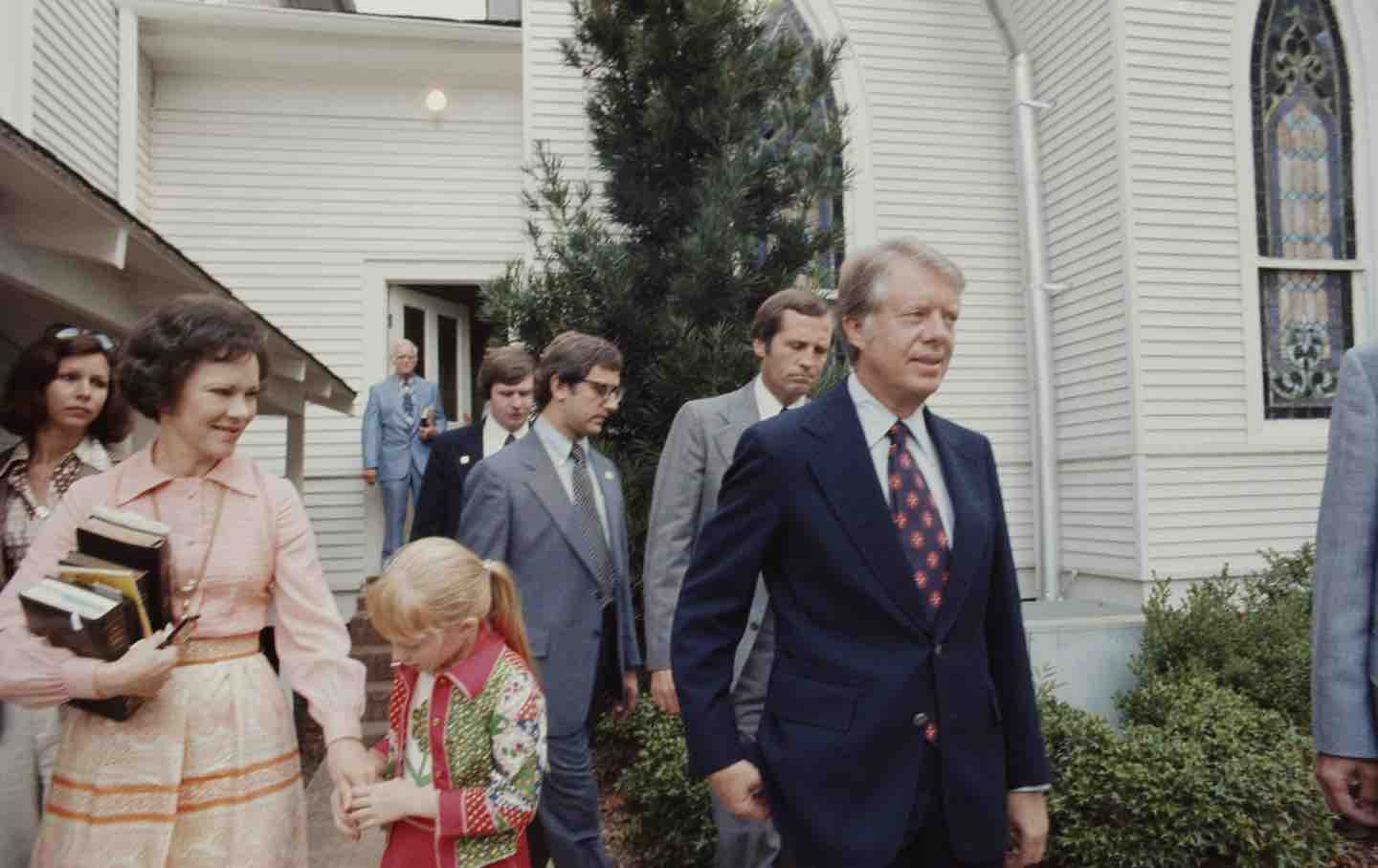
The Baptist Georgia governor won a majority of evangelical Christian voters in the 1976 presidential election. Next time around, those voters had changed sides—for the long haul.
Obituary
/
Chris Lehmann

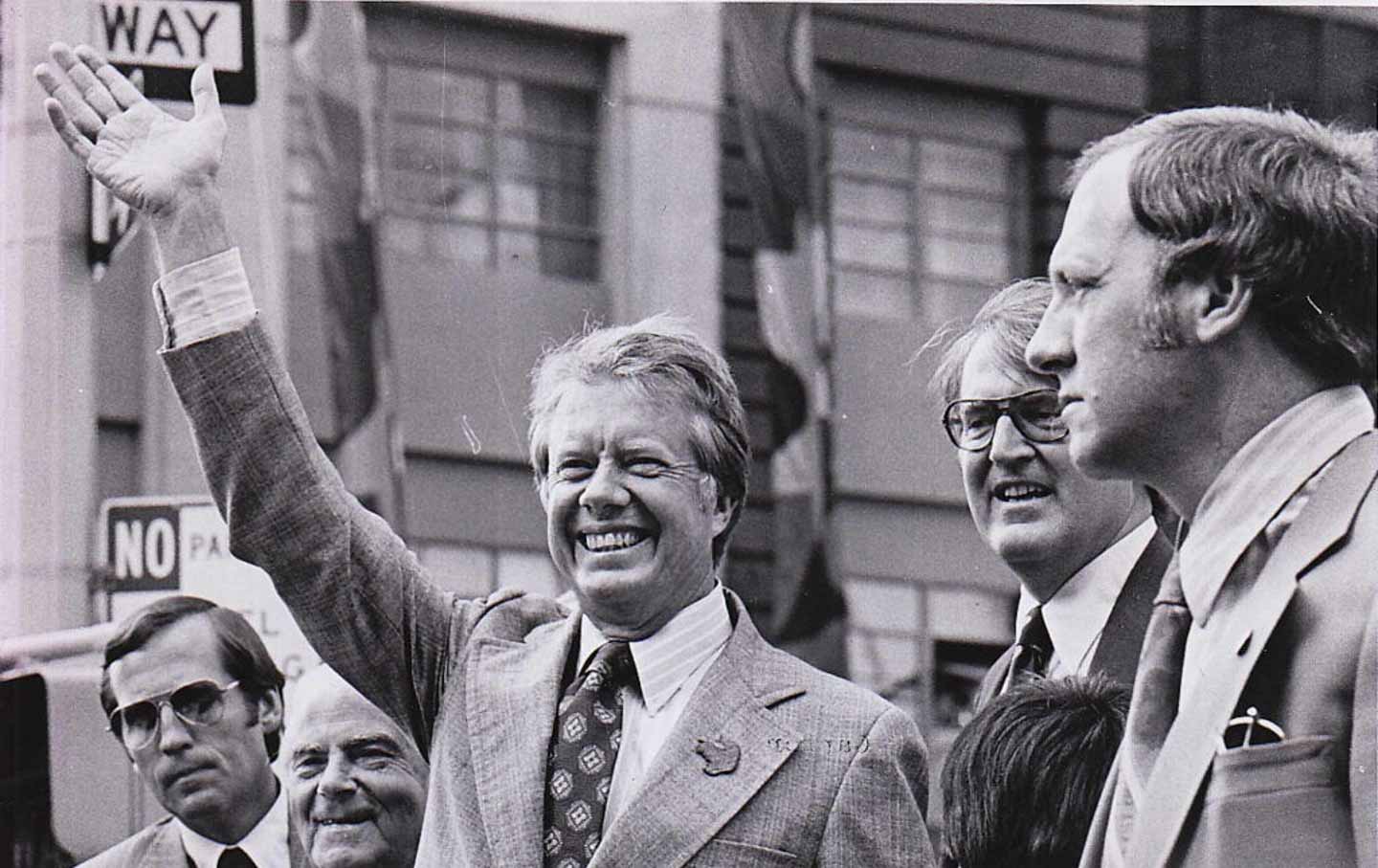
The Southern president, who kept his head down directly following Brown v. Board of Education, would eventually declare that “the time for discrimination is over.”
Obituary
/
Joseph Crespino



